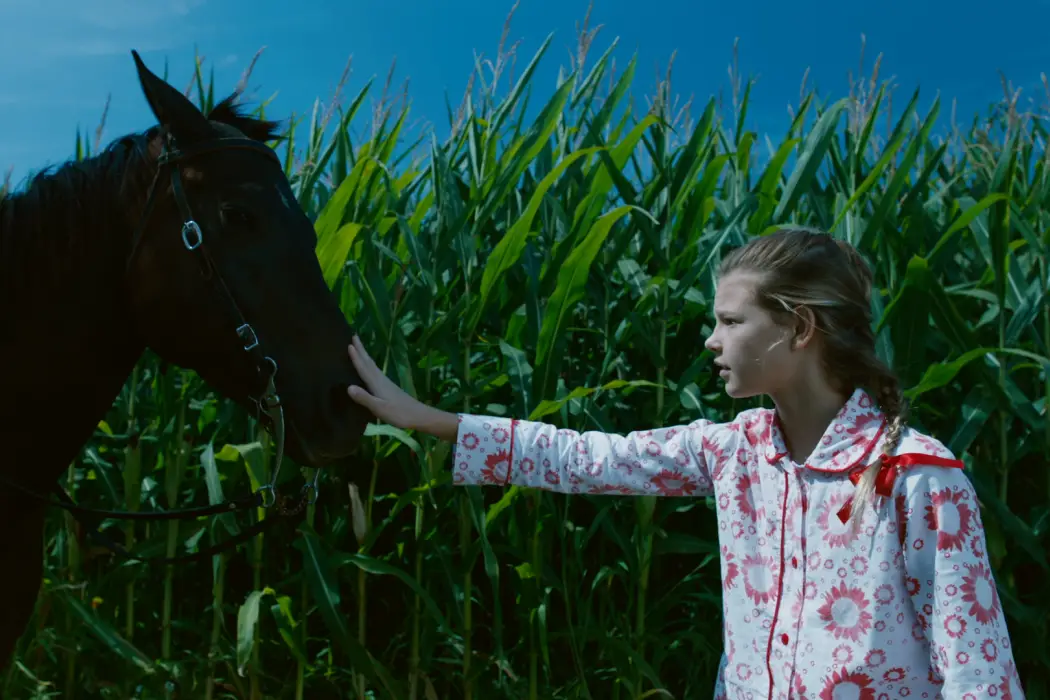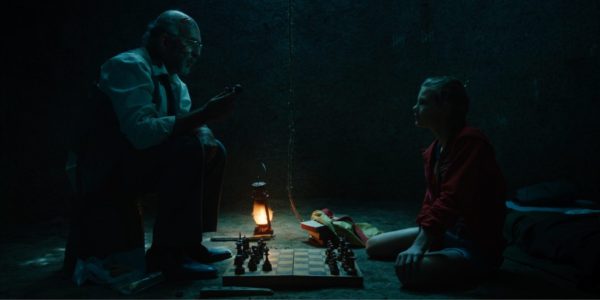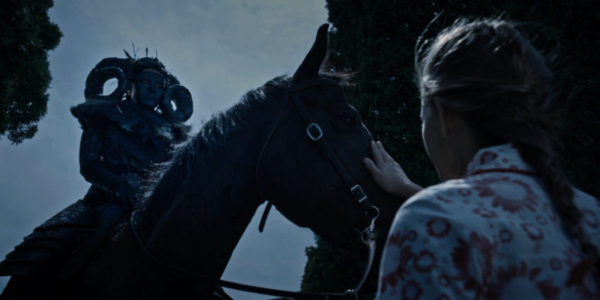AMERICAN FABLE: Almost Magical Enough To Achieve Its Ambitions

American Fable is one of those movies that was probably betrayed by its trailers. People that sought out this movie looking for a horror-fantasy a la Pan’s Labyrinth are going to be sorely disappointed (or maybe pleasantly surprised).
Fable is a slow movie where not all that much happens. That’s not necessarily a bad thing – it’s just going to throw some viewers off, especially if they read too much into iMDB’s categorization of American Fable as a thriller. The fantastical aspects of the movie are fairly subtle and understated, yet impressively effective. And despite a title that implies otherwise, there’s not an immediately obvious moral to the story; there’s a lot left unanswered and a lot left unsaid.
The movie strikes this balance perfectly, leaving us with a thought-provoking narrative that can ignite our imagination instead of a simpler allegory that would teach its lesson and then vanish from our memories. But American Fable doesn’t quite strike all the right chords, lacking just one spark that might have turned this movie into a lasting cult classic.
What does American Fable do right?
Fable’s haunting, clean cinematography is particularly powerful in creating an aura of mysticism and apprehension even before we see anything out of the ordinary. Hyper-real colors give the entire movie a dreamlike feel, leaving us unsure of which parts are reality and which parts are only based in reality. There’s actually a lot in that vein that we’re supposed to be unsure of: which manifestations of Vera (Zuleikha Robinson) are actually real, whether Jonathan (Richard Schiff) can really heal from afar, the motivations of Vera and whoever she’s working for… there are hints, but never hard answers.
That’s the magic of American Fable. Too often, these types of movies engross us with a mysterious buildup, only to shatter our curiosity with a disappointing explanation for everything. But it’s really only disappointing because it limits us to one hard answer instead of letting us dream up infinite possibilities. Fable lets our inner storytellers run wild filling in backstories, finding clues, and making up endings. The details of the story are whatever we make them, and we can choose to believe however much we want to.

Gitty (Peyton Kennedy) is always peeking in places she’s not supposed to be, whether she’s snooping around her living room, hiding in her barn, or peering down on Jonathan like they’re in some twisted version of The Truman Show. She’s usually getting a simplified slice of a much more complicated reality, having to piece together what’s going on based on little clues here and there. In other words, she’s just like the audience. And just like the audience, her imagination is free to fill in the details while struggling with some difficult issues at the same time.
This brings me to the title. It’s ambitious and catchy, but I’m not sure it’s accurate. A fable is usually a simple story with an obvious lesson – a description that does not at all apply to this movie. There are some messages about the dangers of selling out what you believe in, the consequences of an us versus them mentality, and personal choice determining personal identity. But these messages run under the surface, without telling us much other than the fact that we need to think about them. Again, all of this ambiguity works to the movie’s benefit: lessons are much more powerful when we’re allowed to adapt them to our perspectives instead of being outright told what to feel.

What does American Fable do wrong?
Gitty loves a good story – and American Fable’s writers like lots of them, apparently. Don’t get me wrong, I appreciate the sentiment. It’s just that detaching from the plot every so often to listen to stories about scarecrows, the lion and the mouse, and a plane crash – not to mention riddles, an overused poem, and a bible passage – gets a little jarring. It’s like Fable really wants its audience to think it’s clever and profound (and it is, just not for these reasons).
But that’s mostly forgivable. Fable’s biggest problem isn’t really a flaw in and of itself so much as a missed opportunity – a missing puzzle piece in an otherwise beautiful, intricate jigsaw puzzle.
Vera could have and should have been the spark American Fable needed. She should have been flamboyant, magnetic, and bombastic. She is the devil, after all, in this “making a deal with the devil” allegory. She’s supposed to be seductive and ruthlessly manipulative, so we can understand the temptation to bend to her will in the first place. Even everything else surrounding her scenes – the music, the framing, the visual effects – implies captivating enchantment and ominous mystery.
Instead, we get a character so flatly acted it seems Robinson is reading from a cue card. Her lines are delivered with absolutely no emotion, no magnetism, no grandiosity. Vera carries no presence at all in any of her scenes. It’s so blasé that I’m inclined to think her characterization was an intentional choice – just not a good one. We could have gotten a charismatic, fantastical enchantress that made us understand how people could fall under her spell (and someone that could breathe some life into a story that takes itself a bit seriously at times). Instead, we got a character that barely differentiates herself from anyone else in the story.

There are certainly some other flaws with the movie: for all the subtleties about what the story’s really getting at, it’s pretty heavy-handed about the plight of the American farmer. And it comes up with some shallow characters, most noticeably an antagonist who is apparently just there to be belligerently malicious. But again, these aren’t deal-breakers. All other problems would have been forgotten if American Fable had just come up with that one final puzzle piece that would hold everything together, and make everything make sense.
Conclusion
American Fable might have been more appropriately named American Fairy Tale. It’s certainly not concise or clear with its intentions – those run under the surface, to much greater effect. Its fantastical elements blend seamlessly with its real life implications, giving us the freedom to decide what is real versus what is not, and what matters versus what does not. It’s a shame that it’s missing that pièce de résistance that could have transfixed both the characters and the audience. With a bit more energy and a bit more soul, Fable could have been exceptional – instead, it’s just very good.
That’s enough from me – what did you think of American Fable? What did you learn from it? Who was your least favorite character and why was it Martin?
American Fable opened in the US on February 17, 2017. For a list of all release dates, see here.
Does content like this matter to you?
Become a Member and support film journalism. Unlock access to all of Film Inquiry`s great articles. Join a community of like-minded readers who are passionate about cinema - get access to our private members Network, give back to independent filmmakers, and more.













